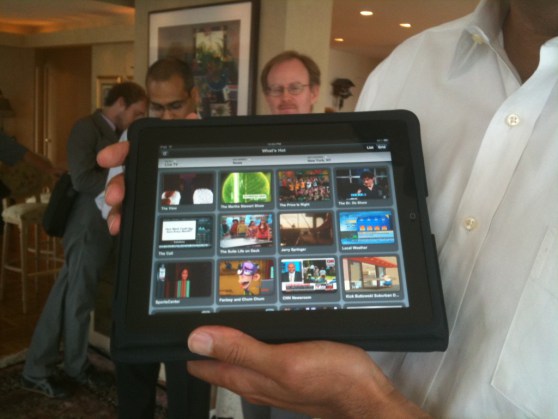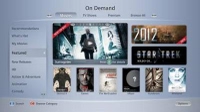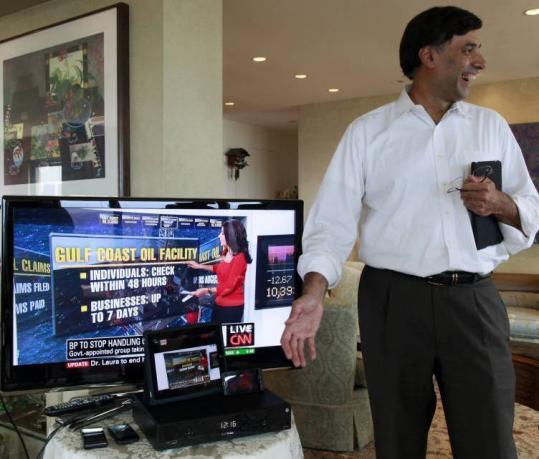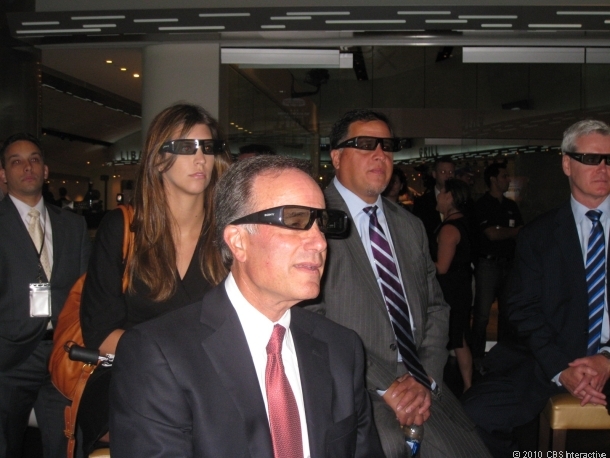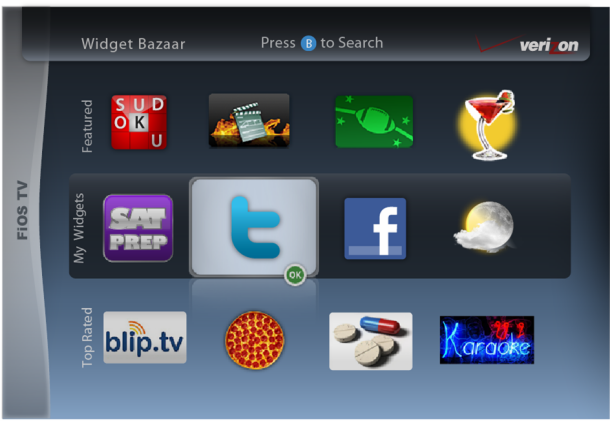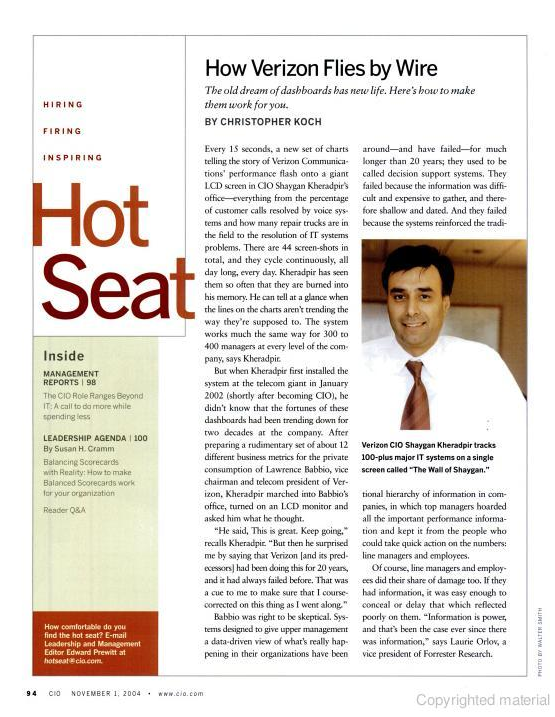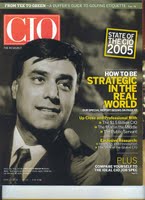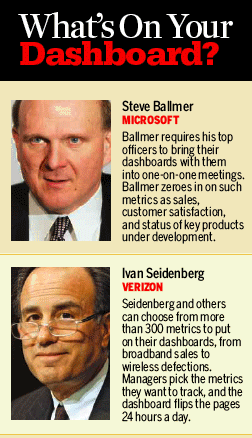Barclays Bank plans to slash software development costs by 90% by building a private cloud infrastructure and moving more applications to machines running the Linux open source operating system.
Read moreNews
Over at Barclays, its retail banking boss Antony Jenkins is looking to boost his division’s technological capabilities, poaching the chief information officer of US telecoms group Verizon Communications.
Shaygan Kheradpir is becoming chief operating officer of the retail banking operations, replacing David Skillen who becomes chief operating officer of Barclays Africa. Mr Kheradpir is to focus on mobile banking, internet banking and branch network infrastructure support.
Read moreVerizon today showed off its attempt at a TV Everywhere offering — which would allow subscribers to its internet/TV/phone bundle service FiOS to access content on screens other than their televisions. It’s working on both an iPad application that would let users view live TV and a video-on-demand (VOD) offering for computers and mobile devices, reports NewTeeVee.
Read moreVerizon is extending its FiOS video service beyond the living room to tablets, PCs and mobile devices.
Late last week Verizon CIO Shaygan Kheradpir hosted an event in New York City and offered a sneak peek of new features coming soon for FiOS customers, as well as some of the company’s long-term plans for FiOS TV. Verizon plans to offer live video programming as well as video-on-demand services to new platforms.
Read moreThink you need another TV in the home? Maybe the iPad, Apple Inc.’s tablet computer, will do the job instead.
In the latest example of the slim device attracting the attention of the TV industry, Verizon Communications Inc. yesterday demonstrated an application that turns the iPad into another screen for its cable TV service.
Read moreIt's not just the TV makers that have a vested interest in pushing video's transformation to 3D TV and beyond. Companies that supply and enable the technology are just as eager to see the next generation of video take hold as the TV makers looking to sell you another big screen.
"Video is today's voice-on-an-IP network," said John Chambers, CEO of Cisco Systems, the largest supplier in the world of IP networking equipment.
Read moreShaygan Kheradpir didn't like what he was hearing. "You guys are lowballing this," he said.
Mr. Kheradpir, the chief information officer of telephone giant Verizon Communications Inc., was reviewing this year's technology budget with his top lieutenants in late January. He didn't think their savings projections were ambitious enough.
Read moreA few issues ago, I wrote a column titled The Next Wave Is Here about the profound changes taking place at the heart of enterprise IT. Well, if those internal changes are profound, the ones taking place at the edge are revolutionary. And they’re also what’s driving the need for internal IT transformation.
If you’ve been reading my column for any period of time, you know I’m not prone to hyperbole. All through the (first) dotcom era, CIO’s take on newly emerging Web businesses was pretty conservative. One piece we wrote, about whether CIOs should ditch their jobs with traditional companies to run IT at a dotcom, was headlined Look Before You Leap and provided a rational framework for making that decision amid all the irrational turn-of-the-century exuberance. (As it turned out, we were probably too conservative on that one. While few of those jobs had good long-term prospects, it’s hard to argue now with the value they provided, experiencewise, as a tour of duty.)
Read moreVerizon Communications is about to open up its new Widget Bazaar to third-party developers to create an "app store" for its Fios TV service in a move that could forever change how people watch TV.
Verizon first announced the Widget Bazaar just a couple of weeks ago. Initially, the company described it as a storefront for new widgets or applications developed by Verizon partners for its Fios TV customers. At the time, Verizon executives downplayed the possibility of a sprawling Widget Bazaar teeming with thousands of applications developed by third parties.
Read moreGetting an information technology department to be more responsive when investors are clamoring to cut selling, general and administrative costs is like a farmer looking for a bumper crop in a drought. It may be possible but it requires a massive rethinking of the problem.
In Verizon‘s case, the situation was even more daunting. For starters, Verizon began life as a regulated utility, a part of the regional Bell operating companies. Improving its competitive edge didn’t even make the “to do” list. Consistency–of service, revenues and even corporate perks–was the goal. Cash shortfalls were made up with rate increases, promotions were frequently based on tenure and new ideas were more often scoffed at than adopted.
Read moreThe old dream of dashboards has new life. Here's how to make them work for you.
Every 15 seconds, a new set of charts telling the story of Verizon Communications' performance flash onto a giant LCD screen in CIO Shaygan Kheradpir's office - everything from the percentage of customer calls resolved by voice systems and how many repair trucks are in the field to the resolution of IT systems problems. There are 44 screen-shots in total, and they cycle continuously, all day long, every day. Kheradpir has seen them so often that they are burned into his memory. He can tell at a glance when the lines on the charts aren't trending the way they're supposed to. The system works much the same way for 300 to 400 managers at every level of the company, says Kheradpir.
Read morePulling all-nighters is nothing new for Shaygan Kheradpir. In grad school, he recalls, "Our brains were going all the time." Now CIO of Verizon, he runs his more than 7,000-person IT organization much like a college lab, a fraternity of smart people who welcome the crazy hours.
Equally demanding of himself, he seems to have taken Verizon's corporate slogan -- "We never stop working for you" -- as his personal motto. After putting in a 10- or 12-hour day, Kheradpir's back online every night for three or four hours: IMing his staff, checking the day's business performance metrics, holding conference calls with developers at 11 p.m. (His wife has banned the late-night speaker phone so that she and the kids can sleep.) His people have grown accustomed to his 3 a.m. e-mails and the fact that Kheradpir might want to discuss them by 7 a.m. But even with all that pressure, Kheradpir claims that headhunters have told him that young developers consider a job with Verizon IT to be a prize. Kheradpir believes that's because there's so much going on at Verizon that a bright, fresh-out-of-college programmer can have a big impact on the company right away. (Verizon's annual IT budget hovers around us$1.5 billion, which translates into hundreds of ongoing projects -- ranging in size from $20,000 to millions -- that keep everyone busy.) Last year, Kheradpir's retail systems group implemented 40 major new systems in 40 weeks for his Fiber-to-the-Premises (FTTP) program, even as IT operations cut costs by around $50 million. (Since becoming CIO in 2002, he's reduced the IT budget by one-third.)
Read moreBoston is a bitter pill for a fan of the New York Yankees and the Cleveland Cavaliers, such as myself. But I guess I'll make the best of it. I'm here to cover -- and participate in -- the MIT Sloan CIO Symposium, which got off to a rousing start with a night-before visionary speech by the CIO of Verizon.
Boston is a bitter pill for a fan of the New York Yankees and the Cleveland Cavaliers, such as myself. But I guess I'll make the best of it. I'm here to cover -- and participate in -- the MIT Sloan CIO Symposium, which got off to a rousing start with a night-before visionary speech by the CIO of Verizon.Shaygan Kheradpir, Verizon's IT chief, told a presymposium dinner crowd that IT has made manifest what Winston Churchill famously referred to as "empires of the mind." ("The empires of the future are the empires of the mind," is the quote attributed to Churchill.) As an example, Kheradpir referred to Shawn Fanning, who wrote Napster, the infamous file-sharing site, while he was a student at Northeastern in Boston. Kheradpir says he remembers thinking, when he first became aware of Napster, "this is the end of media as we know it." Napster was Fanning's "empire of the mind," and it "moved media," Kheradpir pointed out.
Read moreCIO Executive Editor Christopher Koch continues his conversation with Verizon CIO Shaygan Kheradpir and explores the impact of consumer IT on the enterprise and CIOs.
Listen to PodcastIt's one of the most maddening features of all the technology in our lives. There are so many gadgets to connect us--cell phones, e-mail, land-line phones--yet most of the gadgets aren't connected to each other.
Verizon's answer is the new Digital Companion service, which marries Caller ID, Call Forwarding and the Web. The result: no matter how you try to reach some-one, you'll likely get through. The system, launching in phases throughout the year, revolves around private Verizon Web sites that track phone calls in real time and allow users to decide, with one click, which calls should be routed to which phone as they come in.
Read moreIt was New Year's Eve, 2003, and Oracle Corp. (ORCL ) CEO Lawrence J. Ellison was on his honeymoon. He and his bride, romance novelist Melanie Craft, were relaxing on his 243-foot Katana yacht off St. Barts, the Caribbean island known as a haven for movie moguls and rock stars. But Ellison, for the umpteenth time, couldn't help himself. He climbed to his office on the upper deck of the Katana, fired up his computer, and logged on to the Web site of a small company called NetSuite Inc. It was the last day of the fiscal year, and Ellison, the co-founder of NetSuite and its largest investor, needed to know if the startup was going to meet its numbers.
Before the Internet, Ellison says, taking the pulse of a company was sort of ridiculous. To get the latest sales information, he would call several people and wait days for them to process financial reports that often were out of date by the time he got them. "You would use your cell phone and work on feelings," he says.
Read more
